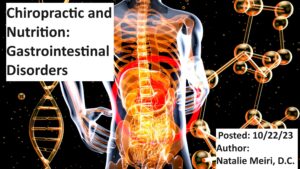
A Chiropractor in West Palm Beach can help you with many ailments by way of adjustments. However, the food you consume on a daily basis has a very large impact on your body and the thousands of underlying processes that go on inside it every day. Nutrition is certainly a significant factor in your health. So some of your lifestyle choices outside of the doctor’s office can influence the effectiveness of treatment. When you eat well, your immune system fights off illness better, you elevate your brain function, you lose weight and your energy soars. By incorporating certain foods into your diet, you can contribute to faster healing and continued wellness.
In this blog post, we’ll take a closer look at Chiropractic and Nutrition: Gastrointestinal Disorders.
What are gastrointestinal disorders?
Gastrointestinal (GI) disorders are diseases or health problems of the digestive tract. Your digestive system includes your esophagus (tube leading to stomach from mouth), stomach, large and small intestines, liver, pancreas and gallbladder. The digestive process involves breaking down of food and drink into nutrients that your body can absorb. Next, your body uses these nutrients as energy and building blocks for cells.
The following are some common gastrointestinal disorders.
1.Reflux Esophagitis/ Hiatal Hernia/ G.E.R.D.
A hiatal hernia occurs when the upper part of the stomach pushes up into the chest through a small opening in the diaphragm, the muscle that separates the abdomen from the chest. This results in retention of acid and other contents. These acids and other substances can easily reflux into the esophagus causing heartburn. So if heartburn continues and is more frequent it can become GERD (Gastroesophageal Reflux Disease).
The symptoms of GERD are also epigastric (upper central region of the abdomen) pain after eating a large meal and lying down. Your esophagus is a muscular tube that connects your mouth and your stomach. The esophageal sphincters (rings of muscle) contract and relax to allow food and liquid to pass. The tone of the lower esophageal sphincter (LES) may decrease with age and also with ingestion of certain foods. In addition, smoking and certain medications also will decrease the tone of the LES, leading to reflux. Moreover, increased pressure from obesity may aggravate symptoms. However, esophageal reflux can be common in healthy athletes, such as conditioned runners, cyclists, and weightlifters. Several mechanisms may account for this, including position, Valsalva (forcefully breathing out against closed windpipe), and indirect effects of exercise on lower esophageal tone.
Lifestyle Changes for Reflux Esophagitis/ Hiatal Hernia/ G.E.R.D.
Avoid lying on your back after eating and during sleep. This reduces the risk of acid from your stomach flowing back into your esophagus, a primary cause of GERD symptoms. So keeping your posture upright creates an easier path for stomach acid to flow back into your esophagus due to gravity’s reduced effect. Similarly, compression of your abdomen by clothing or posture is also bad for digestion. Instead, eat smaller meals and 4 hours before bedtime.
To sooth irritated tissue and relax your lower esophageal sphincter avoid the following substances/foods: progesterone, fat, caffeine, chocolate, alcohol, nicotine, peppermint oil, spearmint oil, red pepper, protein and amino acids, niacin, calcium
To help irritated esophageal mucosa (protective epithelial cell barrier to gastric acid) avoid: aspirin and certain NSAIDS (nonsteroidal anti-inflammatory drugs), alcohol, caffeine, corticosteroids, bile salts, black pepper, chilli pepper, vinegar, mustard, cloves, nutmeg
2. Peptic Ulcer
Peptic ulcer disease, also referred to as stomach or duodenal ulcers, is usually caused by bacteria or the overuse of common pain relievers. Although you may have pain after eating, for most people, pain occurs when the stomach is empty. Moreover, it is four times more common in men than women.
Lifestyle changes for Peptic Ulcer
Firstly, an unrefined, high fiber diet may be helpful. Secondly, avoiding gastric secretagogues and mucousal irrtants is important. To help gastric secretagogues (substance that causes another substance to be secreted) irritation avoid: methylxanthines (alkaloids that can be found in high concentrations in tea, coffee, and chocolate), decaffeinated coffee, alcohol, cola drinks, tobacco. Thirdly, consume no bedtime snacks. Fourthly, rule out food sensitivities. Fifthly, zinc, Glutamine and Nicotinic acid (niacin) supplementation reduced pain and shortened healing time in some studies. Lastly, Cabbage juice is said to benefit peptic ulcer.
3. Irritable Bowel Syndrome (IBS)
IBS is a condition with chronic recurrent abdominal pain with constipation or diarrhea. However, there are no signs of bleeding or inflammation. And IBS is the most common chronic gastrointestinal disorder. Indeed, it is stress related.
Lifestyle changes for IBS:
Firstly, consider a high-fiber low refined carbohydrate diet. Also, include supplemental bran/psyllium husk as tolerated. Secondly, avoid gas-forming foods (onion, beans, melon, cabbage). Thirdly, see if you are lactose intolerant. Fourthly, see if you have other food sensitivities. Fifthly, stress management techniques are essential. Moderate exercise is a suggestion. Lastly, peppermint oil and lactobacillus acidophilus may relieve symptoms.

4. Regional Enteritis (Crohn’s Disease)
Crohn’s disease is a chronic disease that causes inflammation in your digestive tract (small and large intestine). The cause of Crohn’s disease is unknown. Researchers think that an autoimmune reaction may occur. The symptoms are severe cramping and diarrhea. Because of malabsorption of nutrients, anemia, fatigue, and weight loss happens.
Lifestyle changes for Regional Enteritis (Crohn’s disease):
Firstly, consider a hypoallergenic formula diet during acute episodes. Secondly, a high-protein, high micronutrient diet, that includes supplements is necessary. Thirdly, avoid sugar and other refined carbohydrates. Fourthly, find out if you are lactose intolerant or have other food sensitivities. Fifthly, your doctor should monitor your serum proteins and complete blood count test. Lastly, glycosaminoglycan (cartilage extract) and glutamine supplementation may provide additional energy for the intestinal tissue.
5. Ulcerative Colitis
Ulcerative colitis is a chronic, inflammatory bowel disease that causes inflammation in the digestive tract. It is usually only in the innermost lining of the large intestine (colon) and rectum. Again, the cause is attributed to autoimmune disease.
Symptoms include episodic cramping and bloody diarrhea. Ulcerative colitis is most common in young adults. In addition, it may be accompanied by systemic (whole body) symptoms. And there is a high risk for future colon cancer.
Lifestyle changes for Ulcerative colitis:
Firstly, a low-residue (low fiber) lactose free diet with fluid and electrolyte replacement during re-exacerbations is important. Secondly, a normal fiber, high protein (up to double recommended daily allowance) and micronutrient diet which includes supplements (e.g. glycosaminoglycan (cartilage extract) is recommended. Thirdly, your doctor should monitor your serum proteins, electrolytes and complete blood count test. Fourthly, psyllium husk, oat bran or pectin may ameliorate the diarrhea. Fifthly, avoid sugar and other refined carbohydrates. Lastly, find out about any food sensitivities you may have.
*For all the above, please check with your primary care doctor before implementation.

Chiropractic and Nutrition: Gastrointestinal Disorders
According to the National Board of Chiropractic Examiners’ (Nabco’s) Practice Analysis of Chiropractic 2015 “Chiropractic is based on the premise that the body is able to achieve and maintain health through its own natural recuperative powers, provided it has a properly functioning nervous system and receives the necessary health maintenance components. These components include adequate nutrition, water, rest exercise and clean air”.
Your chiropractor in West Palm Beach will adjust your spine to improve the relationship between the spine and nervous system, which affects the function of all the organs and systems in your body. She will educate you on how to prevent future suffering by learning and implementing a lifestyle for health self enhancement. In this regard, we may give take home exercises, recommend ergonomic changes and nutritional changes. Call Dr. Natalie Meiri, your chiropractor in West Palm Beach to make an appointment or to find out more about Chiropractic and Nutrition: Gastrointestinal Disorders at 561-253-8984.